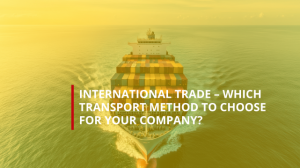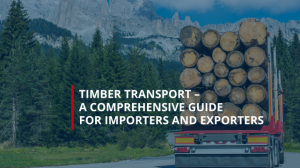
FIND OUT MORE ABOUT OUR CUSTOMS AGENCY SERVICES!
Contact us today and let's talk about your business needs!


Customs clearance is a process designed to control goods entering and leaving the customs territory. It is a key element of international trade that affects the smooth and legal movement of goods. The process can vary depending on the type of customs clearance that is applied. In this article we will discuss the different types of customs clearance, noting their specifics and practical application.
There are several basic types of customs clearance, which are adapted to different needs and situations in international trade. Among them are export clearance, import clearance/release, import clearance under the 4200 procedure. Each of these types has its own specific features and processes, which will be discussed below.
Basic types of customs clearance:
– Export clearance – refers to the removal of goods outside the customs territory of the European Union. It is a procedure that aims to control the legality of exports, verify documentation and ensure that exported goods meet all customs and regulatory requirements of the exporter’s and importer’s country. Export clearance is crucial to maintaining the legality of international trade transactions and protecting the country’s economic interests.
– Import clearance – is a process that applies to goods entering the customs territory of the European Union. This procedure involves detailed inspection of goods, verification of documents, and the calculation and collection of customs duties and taxes. Import customs clearance is a key element in ensuring the safety and legality of goods entering the internal market.
– Import customs clearance under the 4200 procedure – is addressed to entities importing goods into the European Union through the territory of Poland. The procedure allows importers to benefit from exemption from VAT on goods (subject to certain conditions, of course).
Determining the type of customs clearance to be used in a given situation depends on a number of factors, such as the nature of the goods, the purpose of their import or export, and specific regulatory requirements. Choosing the right type of customs clearance is crucial to properly carry out customs procedures and avoid potential legal and financial problems.
Documentation is an integral part of any type of customs clearance. Proper preparation of documents, such as invoices, bills of lading, certificates of origin or documents proving compliance with sanitary or phytosanitary standards, is crucial for smooth clearance. Customs agencies and freight forwarders often offer consulting services for the preparation of the necessary documentation, making the clearance process much easier.
Cooperation with professional customs agencies can greatly facilitate the customs clearance process. These agencies have the experience and knowledge to handle all clearance formalities efficiently. This allows entrepreneurs to focus on their core business, leaving customs issues in the hands of experts.
In addition to the standard types of customs clearance, there are also special procedures and exceptions that can be applied in certain situations. Examples include simplified procedures, which allow faster clearance of goods for companies that meet certain criteria, or procedures for goods shipped as humanitarian aid. Each of these procedures has its own specific requirements and applications that must be thoroughly known and understood.
Types of customs clearance – summary
Types of customs clearance, such as export clearance, import clearance and import clearance under the 4200 procedure, have their own specific features and procedures that are tailored to the different needs of international trade. Each type of customs clearance is designed to ensure the legality and security of goods crossing borders, and their proper application is crucial to the smooth functioning of international supply chains.
In practice, determining the type of customs clearance to be applied in a given situation requires careful analysis and knowledge of customs regulations and the specifics of the goods being transported. That is why cooperation with experienced customs agencies and consultants is invaluable for companies involved in international trade.
The proper organization of customs processes, including the correct choice of the type of customs clearance, can significantly affect a company’s operational efficiency, reduce costs and minimize the risks associated with international trade. In today’s globalized world, where trade borders are increasingly open, understanding and correctly applying customs procedures is crucial to success in the international market.
Contact us today and let's talk about your business needs!






| Cookie | Duration | Description |
|---|---|---|
| cookielawinfo-checkbox-analytics | 11 months | This cookie is set by GDPR Cookie Consent plugin. The cookie is used to store the user consent for the cookies in the category "Analytics". |
| cookielawinfo-checkbox-functional | 11 months | The cookie is set by GDPR cookie consent to record the user consent for the cookies in the category "Functional". |
| cookielawinfo-checkbox-necessary | 11 months | This cookie is set by GDPR Cookie Consent plugin. The cookies is used to store the user consent for the cookies in the category "Necessary". |
| cookielawinfo-checkbox-performance | 11 months | This cookie is set by GDPR Cookie Consent plugin. The cookie is used to store the user consent for the cookies in the category "Performance". |
| viewed_cookie_policy | 11 months | The cookie is set by the GDPR Cookie Consent plugin and is used to store whether or not user has consented to the use of cookies. It does not store any personal data. |